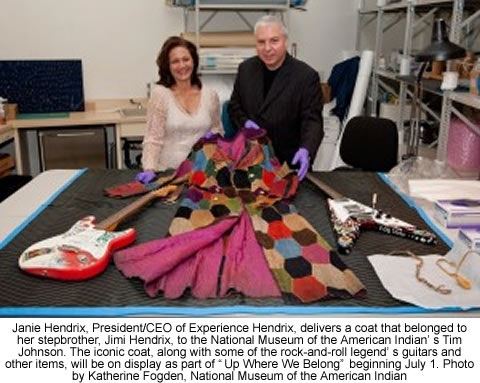 |
Canku Ota
|
 |
|
(Many Paths)
|
||
|
An Online Newsletter
Celebrating Native America
|
||
|
August 1, 2010 - Volume
8 Number 7
|
||
|
|
||
|
Exhibition Spotlights
Native Americans In Rock And Roll
|
||
|
by Kara Briggs, American
Indian News Service
|
||
 “Up
Where We Belong,” a 1982 crossover hit co-written by Cree folk
singer Buffy Sainte-Marie, lends its name to an upcoming exhibition
about American Indians in rock and pop music at the Smithsonian’s
National Museum of the American Indian. “Up
Where We Belong,” a 1982 crossover hit co-written by Cree folk
singer Buffy Sainte-Marie, lends its name to an upcoming exhibition
about American Indians in rock and pop music at the Smithsonian’s
National Museum of the American Indian. “We’re trying to show where Native musicians were instrumental in crafting the big American music,” said Tim Johnson, one of the museum’s associate directors, “and document instances where Native musicians were right in the center of it.” The exhibition opens July 1. “Up Where We Belong” was popularized by Joe Cocker and Jennifer Warnes in the movie “An Officer and a Gentleman,” winning the 1982 Oscar for Best Song. Sainte-Marie co-wrote the song with Jack Nitzsche and also made a recording of it. Hendrix was raised with his Cherokee grandmother, a former vaudevillian who passed on her performance gene as well as a taste for extravagant stage clothes. Janie Hendrix, the late singer’s stepsister, loaned the museum Hendrix’s long, multi-colored leather patchwork coat. It was one of the few pieces of Hendrix’s belongings that his father was able to recover from the musician’s apartment after his death at age 27 in 1970. The rest were stolen. “The coat has never been exhibited anywhere before,” Johnson said. “Janie Hendrix personally delivered it after we indicated that we didn’t want a guitar or a gold record. We wanted the person.” Hendrix may only be the most famous of the Native artists to emerge in the 1960s and 1970s. The band Redbone, a pair of Yaqui/Shoshone brothers who played with a Cheyenne drummer and a flamenco guitarist, performed hits like “Come and Get Your Love.” Others, such as Jesse “Ed” Davis, who was Comanche and Kiowa, and Link Wray, Shawnee, were musician’s musicians. Davis was a session guitarist in the 1970s who performed with each of the former Beatles. At one point John Lennon asked producer Phil Spector to get Davis to help Lennon create what he called the “back to the roots” sound on his 1975 album “Rock ‘n’ Roll.” Davis also gave voice to Native themes through songs like “Washita Love Child” and set John Trudell’s spoken poetry to music for the album “AKA Graffiti Man.” It was nominated for a Grammy in 1986, two years before Davis died. Link Wray’s 1958 song “Rumble” helped set a course for rock-and-roll guitar, loud and distorted and foreboding. The song was banned for its title’s suggestion of violence. In 2003, the Rock and Roll Hall of Fame named “Rumble” to a list of 500 songs that shaped rock music. Watch and listen to the songwriter’s version of “Up Where We Belong” at www.youtube.com/watch?v=rLCk066o9sU Watch
and listen to Jimi Hendrix perform “Hey Joe” at Watch and listen to Redbone perform “Come and Get Your Love” at www.youtube.com/watch?v=KO3Y4W5xJdI&feature=related Watch
and listen to Davis perform on Taj Mahal’s 1968 “Everybody
Got to Change Sometime,” Watch and listen to Link Wray from a 1978 video, www.youtube.com/watch?v=LUHz0i8_ziAhttp://www.youtube.com/watch?v=LUHz0i8_ziA |
|
|
||
|
|
||
| Canku Ota is a free Newsletter celebrating Native America, its traditions and accomplishments . We do not provide subscriber or visitor names to anyone. Some articles presented in Canku Ota may contain copyright material. We have received appropriate permissions for republishing any articles. Material appearing here is distributed without profit or monetary gain to those who have expressed an interest. This is in accordance with Title 17 U.S.C. Section 107. | ||
|
Canku Ota is a copyright ©
2000, 2001, 2002, 2003, 2004, 2005, 2006, 2007, 2008, 2009, 2010
of Vicki Barry and Paul Barry.
|
||
 |
 |
|
|
The "Canku
Ota - A Newsletter Celebrating Native America" web site and
its design is the
|
||
|
Copyright ©
1999, 2000, 2001, 2002, 2003, 2004, 2005,
2006, 2007, 2008, 2009, 2010
of Paul C. Barry.
|
||
|
All Rights Reserved.
|
||